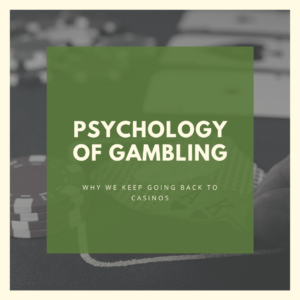Gambling is a popular pastime that has existed for centuries, but have you ever wondered why we keep returning to casinos? The answer lies in the psychology of gambling, which can be both alluring and risky. In this article, we’ll explore the appeal of gambling, the potential risks, and strategies for gambling responsibly. Let’s dive in!

The Appeal of Gambling
For many people, gambling is an exciting and alluring activity that provides a rush of adrenaline and the potential for big rewards. The thrill of taking risks and the chance to win big are key factors that draw people to casinos and other gambling establishments. The social aspect of gambling, such as playing with friends or meeting new people, can also be a significant draw.
Research has shown that the experience of gambling can release dopamine, a neurotransmitter associated with pleasure and reward, in the brain. This can create a feedback loop where the brain associates gambling with pleasure and seeks it out more frequently.
The Risks of Gambling
While gambling can be fun and exciting, it carries significant risks. One of the most well-known risks of gambling is addiction. Like substance abuse, repeated gambling exposure can lead to brain changes that result in addiction.
Another risk of gambling is financial ruin. Because gambling is a game of chance, it’s possible to lose significant amounts of money quickly. This can lead to financial difficulties, including debt and bankruptcy.
In addition to addiction and financial ruin, gambling can negatively affect mental health. For example, problem gambling has been linked to anxiety, depression, and suicide.
Common Myths About Gambling
There are many myths and misconceptions about gambling, which can contribute to unrealistic expectations and unhealthy behaviors. For example, some people believe that slot machines are “due” for a win after a certain number of losses or that certain betting strategies can increase their odds of winning.
However, gambling is largely a game of chance, and the odds are typically stacked against the player. While some betting strategies may offer slight advantages in certain circumstances, they can never guarantee a win.
Strategies for Responsible Gambling
To minimize the risks associated with gambling, it’s important to approach the activity with a responsible mindset. Here are some strategies for responsible gambling:
Set a budget: Before you start gambling, decide how much money you will spend and stick to that budget.
Take breaks: To avoid becoming too engrossed in gambling, it’s important to take regular breaks from the activity.
Avoid chasing losses: It’s important to avoid the temptation of chasing losses while gambling. Continuously playing in an attempt to recover lost money can result in a pattern of increasingly risky behavior that may exacerbate the situation.
Seek help: If you’re struggling with problem gambling, seeking help is important. Many resources, such as hotlines, support groups, and therapy, are available.
Psychology of Gambling – Conclusion
In conclusion, the psychology of gambling is complex and multi-faceted. While the appeal of gambling can be strong, it’s important to approach the activity with a responsible mindset and awareness of the potential risks. By understanding the true nature of gambling, addressing common myths and misconceptions, and following strategies for responsible gambling, players can enjoy the activity in a safe and sustainable way. Remember, gambling should be a form of entertainment, not a source of financial or emotional distress.

I hold the prestigious role of Head of Content at Best United States Casinos, where I lead the charge in content creation and strategy. Fueled by my profound passion for casinos and backed by years of industry experience, I am a powerhouse of knowledge. My dedication shines through in my mission to craft captivating and informative content that resonates with casino enthusiasts across the globe. Whether it’s uncovering the latest trends or diving into the nuances of gameplay, I am committed to delivering top-notch content that keeps audiences engaged and informed.








